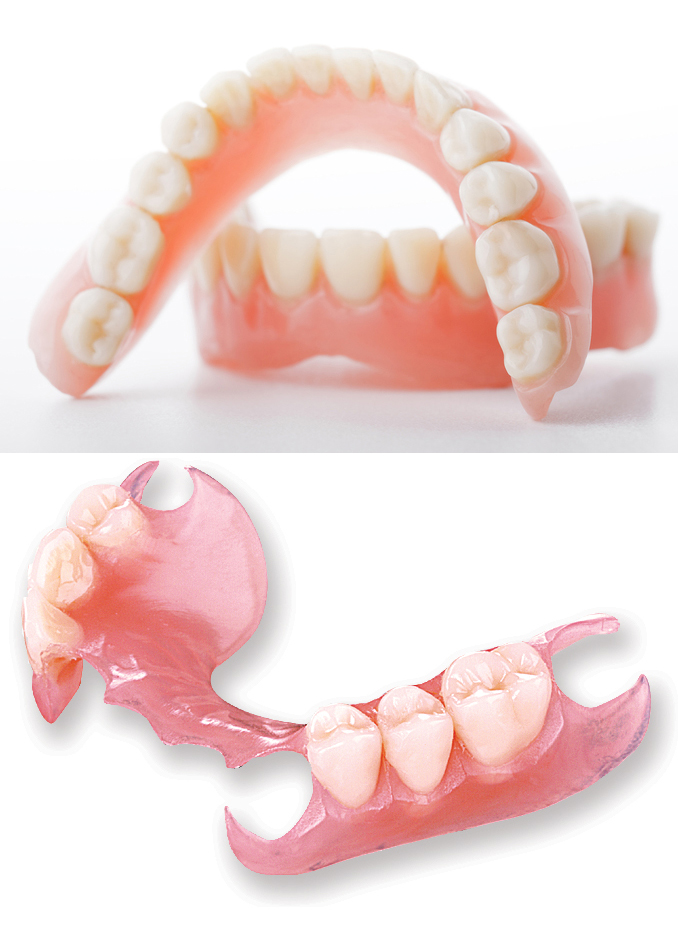Full/Partial Dentures
If you have missing or experienced loss of your natural teeth, dentures may be a simple solution for you to improve your smile and oral health. Tooth loss can result from lack of care resulting in gum disease or decay, or even trauma due to injury. Whatever the reason, dentures can be used to cover those missing teeth. They are removable to allow ease of maintenance and upkeep.
Problems With Missing Teeth
It is important that missing teeth are covered or replaced as it will lead to many problems. The biggest concern of a missing tooth is the shifting or drifting of the surrounding teeth. Teeth will super-erupt if left without an opposing tooth. If significant shifting occurs, there is risk of loosening or actual loss of more teeth. Other concerns of missing teeth is the affects it has on your facial structure and profile, such as hollowing of your cheeks making you appear older. Missing teeth affects your speech and chewing, which are essential to our every day lives.
Are There Different Types of Dentures
There are two types of dentures. They are Conventional and Immediate, and they differ in the way the dentures are prepared.
CONVENTIONAL
The conventional method is more extensive and will require at least 2 dental visits. During your first visit, your dentist will remove the remaining parts of your tooth or teeth. Sufficient time is allowed for your mouth and tissue to fully heal before your next appointment. On your second visit, your dentist will custom make your fully removable dentures. The conventional method may take as long as several months, depending on how long it takes your mouth and tissue to heal. This is the more precise method and the result is a better fitting denture.
IMMEDIATE
With the immediate method, your dentures are made on the same day. During your visit, your dentist will make your fully removable dentures after removing your remaining teeth. This is done by carefully taking an impression of your mouth and making the models for your jaw. Next, your dentures are made and fitted and you actually leave with them in your mouth and throughout the time in which your mouth and tissue are healing. Once fully healed, you will need to schedule a second visit to allow your dentist to relined your dentures to adjust for minor movement due to healing. If significant movement occurred, your dentures may need to be remade. This is a more convenient method since you do leave with dentures. However, it is not as precise as the conventional method.
Life With Dentures
There will be a period of adjustment or “getting use to” as new dentures can feel awkward in your mouth. The dentures may initially feel loose while your tongue and cheek learn to keep them in place. You may feel some slight irritation and have increased flow of saliva during this adjustment period. It is recommended that you come in for follow-ups to allow your dentist to check and make adjustments as needed.
Dentures do not preclude you from practicing good dental hygiene. You still need to brush your gums, teeth, and roof of your mouth thoroughly before inserting your dentures in the morning. This will reduce plaque buildup and helps with the circulation of your treated gum tissue. Your dentures should also be brushed daily when you remove them for proper care and maintenance.
Tips for Maintaining Your New Dentures
• Rinse your dentures thoroughly before brushing to help remove any loose food or debris.
• Gently brush the surfaces of the dentures using a soft bristle toothbrush and a non-abrasive cleanser.
• Thoroughly brush your teeth, gums, cheeks, tongue, and roof of your mouth to remove any plaque and prevent buildup. This will also help to reduce the risk of oral irritation and bad breath.
• When not in use, safely store your dentures and making sure you keep them submerged in water to avoid warping.
• If your dentures require adhesive, either in a form of a cream, powder, pad/wafer, strip, or liquid, it is very important that you read and follow the recommended instructions for care and maintenance.






